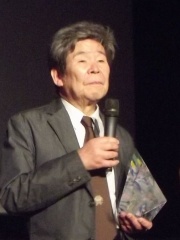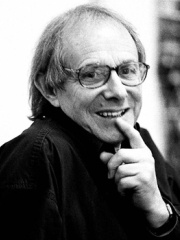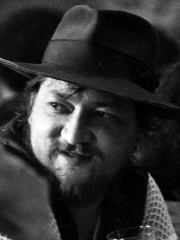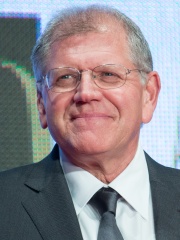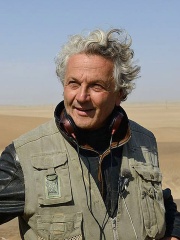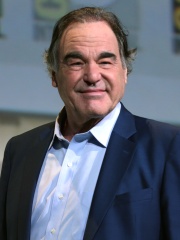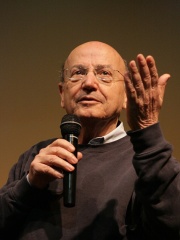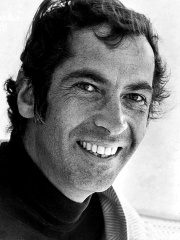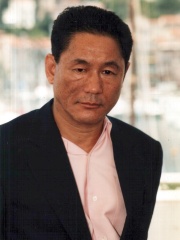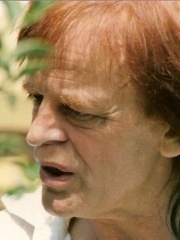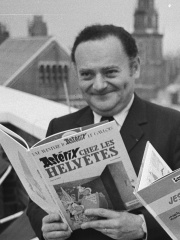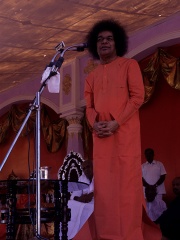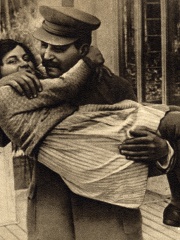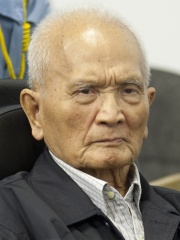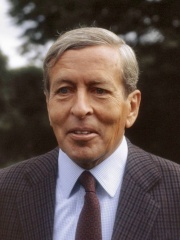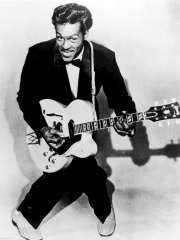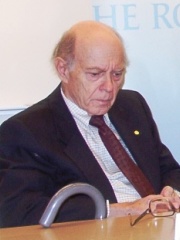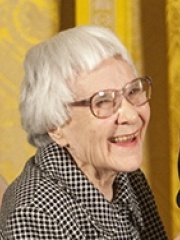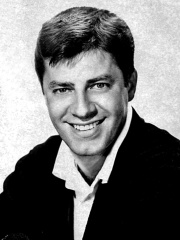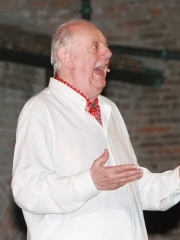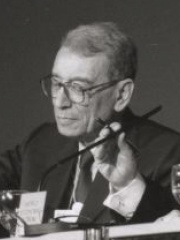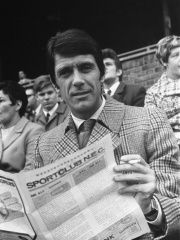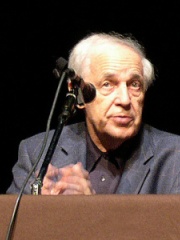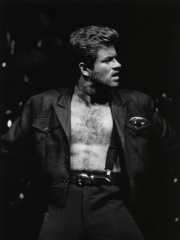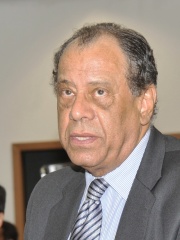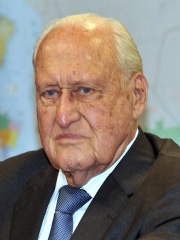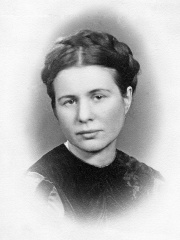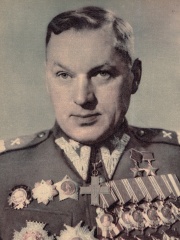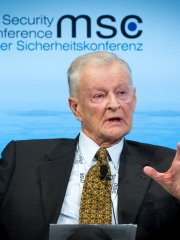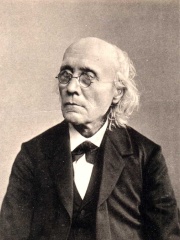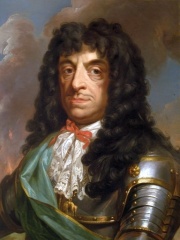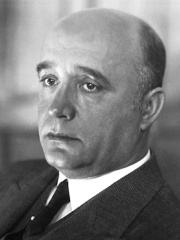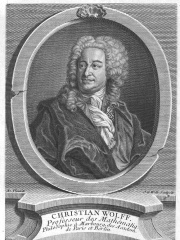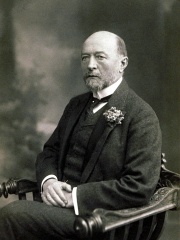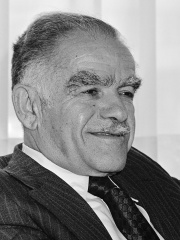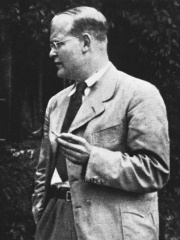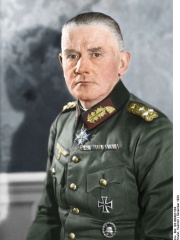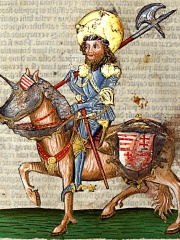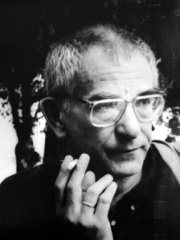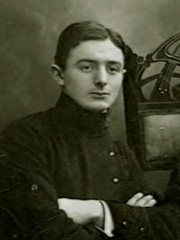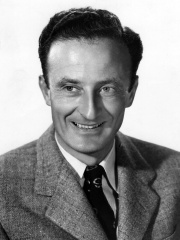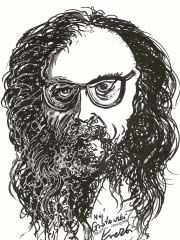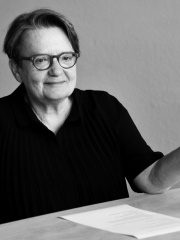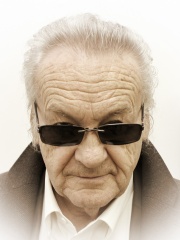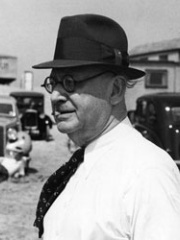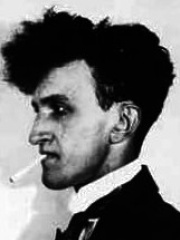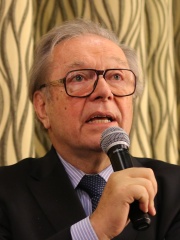FILM DIRECTOR
Andrzej Wajda
1926 - 2016
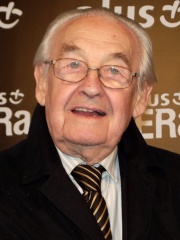
 Andrzej Wajda
Andrzej Wajda
Andrzej Witold Wajda (Polish: [ˈandʐɛj ˈvajda]; 6 March 1926 – 9 October 2016) was a Polish film and theatre director. Recipient of an Honorary Oscar, the Palme d'Or, as well as Honorary Golden Lion and Honorary Golden Bear Awards, he was a prominent member of the "Polish Film School". He was known especially for his trilogy of war films consisting of A Generation (1955), Kanał (1957) and Ashes and Diamonds (1958). He is considered one of the world's most renowned filmmakers, whose works chronicled his native country's political and social evolution and dealt with the myths of Polish national identity offering insightful analyses of the universal element of the Polish experience – the struggle to maintain dignity under the most trying circumstances. Read more on Wikipedia
His biography is available in 69 different languages on Wikipedia (up from 68 in 2024). Andrzej Wajda is the 48th most popular film director (down from 34th in 2024), the 70th most popular biography from Poland (down from 35th in 2019) and the 3rd most popular Polish Film Director.
Andrzej Wajda is most famous for being a Polish film director. He is best known for his 1975 film "The Promised Land" which won the Palme d'Or at the Cannes Film Festival.
Memorability Metrics
Page views of Andrzej Wajda by language
Among FILM DIRECTORS
Among film directors, Andrzej Wajda ranks 48 out of 2,041. Before him are Isao Takahata, Tinto Brass, Tim Burton, Roberto Rossellini, Ken Loach, and Rainer Werner Fassbinder. After him are Robert Zemeckis, George Miller, Oliver Stone, Theo Angelopoulos, Roger Vadim, and Takeshi Kitano.
Most Popular Film Directors in Wikipedia
Go to all RankingsIsao Takahata
1935 - 2018
HPI: 74.87
Rank: 42
Tinto Brass
1933 - Present
HPI: 74.81
Rank: 43
Tim Burton
1958 - Present
HPI: 74.69
Rank: 44
Roberto Rossellini
1906 - 1977
HPI: 74.58
Rank: 45
Ken Loach
1936 - Present
HPI: 74.28
Rank: 46
Rainer Werner Fassbinder
1945 - 1982
HPI: 74.27
Rank: 47
Andrzej Wajda
1926 - 2016
HPI: 74.25
Rank: 48
Robert Zemeckis
1952 - Present
HPI: 74.20
Rank: 49
George Miller
1945 - Present
HPI: 74.10
Rank: 50
Oliver Stone
1946 - Present
HPI: 74.09
Rank: 51
Theo Angelopoulos
1935 - 2012
HPI: 74.06
Rank: 52
Roger Vadim
1928 - 2000
HPI: 73.96
Rank: 53
Takeshi Kitano
1947 - Present
HPI: 73.76
Rank: 54
Contemporaries
Among people born in 1926, Andrzej Wajda ranks 21. Before him are Klaus Kinski, René Goscinny, Sathya Sai Baba, Svetlana Alliluyeva, Nuon Chea, and Prince Claus of the Netherlands. After him are Chuck Berry, Miles Davis, Irwin Rose, Harper Lee, Hugh Hefner, and Jerry Lewis. Among people deceased in 2016, Andrzej Wajda ranks 22. Before him are Dario Fo, Boutros Boutros-Ghali, Cesare Maldini, Pierre Boulez, George Michael, and Nancy Reagan. After him are Carlos Alberto Torres, João Havelange, Harper Lee, Prince, Abbas Kiarostami, and Carlo Azeglio Ciampi.
Others Born in 1926
Go to all RankingsKlaus Kinski
ACTOR
1926 - 1991
HPI: 75.81
Rank: 15
René Goscinny
COMIC ARTIST
1926 - 1977
HPI: 75.31
Rank: 16
Sathya Sai Baba
RELIGIOUS FIGURE
1926 - 2011
HPI: 75.23
Rank: 17
Svetlana Alliluyeva
WRITER
1926 - 2011
HPI: 75.06
Rank: 18
Nuon Chea
POLITICIAN
1926 - 2019
HPI: 74.45
Rank: 19
Prince Claus of the Netherlands
NOBLEMAN
1926 - 2002
HPI: 74.41
Rank: 20
Andrzej Wajda
FILM DIRECTOR
1926 - 2016
HPI: 74.25
Rank: 21
Chuck Berry
MUSICIAN
1926 - 2017
HPI: 73.97
Rank: 22
Miles Davis
MUSICIAN
1926 - 1991
HPI: 73.83
Rank: 23
Irwin Rose
BIOLOGIST
1926 - 2015
HPI: 73.60
Rank: 24
Harper Lee
WRITER
1926 - 2016
HPI: 73.28
Rank: 25
Hugh Hefner
BUSINESSPERSON
1926 - 2017
HPI: 73.04
Rank: 26
Jerry Lewis
ACTOR
1926 - 2017
HPI: 72.82
Rank: 27
Others Deceased in 2016
Go to all RankingsDario Fo
WRITER
1926 - 2016
HPI: 76.74
Rank: 16
Boutros Boutros-Ghali
DIPLOMAT
1922 - 2016
HPI: 76.72
Rank: 17
Cesare Maldini
SOCCER PLAYER
1932 - 2016
HPI: 75.66
Rank: 18
Pierre Boulez
COMPOSER
1925 - 2016
HPI: 75.40
Rank: 19
George Michael
SINGER
1963 - 2016
HPI: 74.39
Rank: 20
Nancy Reagan
ACTOR
1921 - 2016
HPI: 74.38
Rank: 21
Andrzej Wajda
FILM DIRECTOR
1926 - 2016
HPI: 74.25
Rank: 22
Carlos Alberto Torres
SOCCER PLAYER
1944 - 2016
HPI: 73.89
Rank: 23
João Havelange
BUSINESSPERSON
1916 - 2016
HPI: 73.88
Rank: 24
Harper Lee
WRITER
1926 - 2016
HPI: 73.28
Rank: 25
Prince
SINGER
1958 - 2016
HPI: 73.16
Rank: 26
Abbas Kiarostami
FILM DIRECTOR
1940 - 2016
HPI: 72.89
Rank: 27
Carlo Azeglio Ciampi
POLITICIAN
1920 - 2016
HPI: 72.60
Rank: 28
In Poland
Among people born in Poland, Andrzej Wajda ranks 70 out of 1,694. Before him are Irena Sendler (1910), Konstantin Rokossovsky (1896), Zbigniew Brzezinski (1928), Gustav Fechner (1801), John II Casimir Vasa (1609), and Friedrich Bergius (1884). After him are Christian Wolff (1679), Emil von Behring (1854), Yitzhak Shamir (1915), Dietrich Bonhoeffer (1906), Werner von Blomberg (1878), and Ladislaus I of Hungary (1046).
Others born in Poland
Go to all RankingsIrena Sendler
SOCIAL ACTIVIST
1910 - 2008
HPI: 74.81
Rank: 64
Konstantin Rokossovsky
MILITARY PERSONNEL
1896 - 1968
HPI: 74.73
Rank: 65
Zbigniew Brzezinski
POLITICIAN
1928 - 2017
HPI: 74.64
Rank: 66
Gustav Fechner
PSYCHOLOGIST
1801 - 1887
HPI: 74.35
Rank: 67
John II Casimir Vasa
POLITICIAN
1609 - 1672
HPI: 74.33
Rank: 68
Friedrich Bergius
CHEMIST
1884 - 1949
HPI: 74.25
Rank: 69
Andrzej Wajda
FILM DIRECTOR
1926 - 2016
HPI: 74.25
Rank: 70
Christian Wolff
PHILOSOPHER
1679 - 1754
HPI: 74.23
Rank: 71
Emil von Behring
PHYSICIAN
1854 - 1917
HPI: 74.21
Rank: 72
Yitzhak Shamir
POLITICIAN
1915 - 2012
HPI: 74.15
Rank: 73
Dietrich Bonhoeffer
RELIGIOUS FIGURE
1906 - 1945
HPI: 74.02
Rank: 74
Werner von Blomberg
MILITARY PERSONNEL
1878 - 1946
HPI: 74.01
Rank: 75
Ladislaus I of Hungary
POLITICIAN
1046 - 1095
HPI: 73.83
Rank: 76
Among FILM DIRECTORS In Poland
Among film directors born in Poland, Andrzej Wajda ranks 3. Before him are Billy Wilder (1906), and Krzysztof Kieślowski (1941). After him are Dziga Vertov (1896), Fred Zinnemann (1907), Jerzy Grotowski (1933), Agnieszka Holland (1948), Jerzy Skolimowski (1938), Robert Wiene (1873), Jean Epstein (1897), Jerzy Stuhr (1947), and Krzysztof Zanussi (1939).
Billy Wilder
1906 - 2002
HPI: 75.36
Rank: 1
Krzysztof Kieślowski
1941 - 1996
HPI: 75.06
Rank: 2
Andrzej Wajda
1926 - 2016
HPI: 74.25
Rank: 3
Dziga Vertov
1896 - 1954
HPI: 72.03
Rank: 4
Fred Zinnemann
1907 - 1997
HPI: 71.49
Rank: 5
Jerzy Grotowski
1933 - 1999
HPI: 69.33
Rank: 6
Agnieszka Holland
1948 - Present
HPI: 67.01
Rank: 7
Jerzy Skolimowski
1938 - Present
HPI: 66.63
Rank: 8
Robert Wiene
1873 - 1938
HPI: 66.13
Rank: 9
Jean Epstein
1897 - 1953
HPI: 65.61
Rank: 10
Jerzy Stuhr
1947 - 2024
HPI: 65.55
Rank: 11
Krzysztof Zanussi
1939 - Present
HPI: 64.47
Rank: 12
